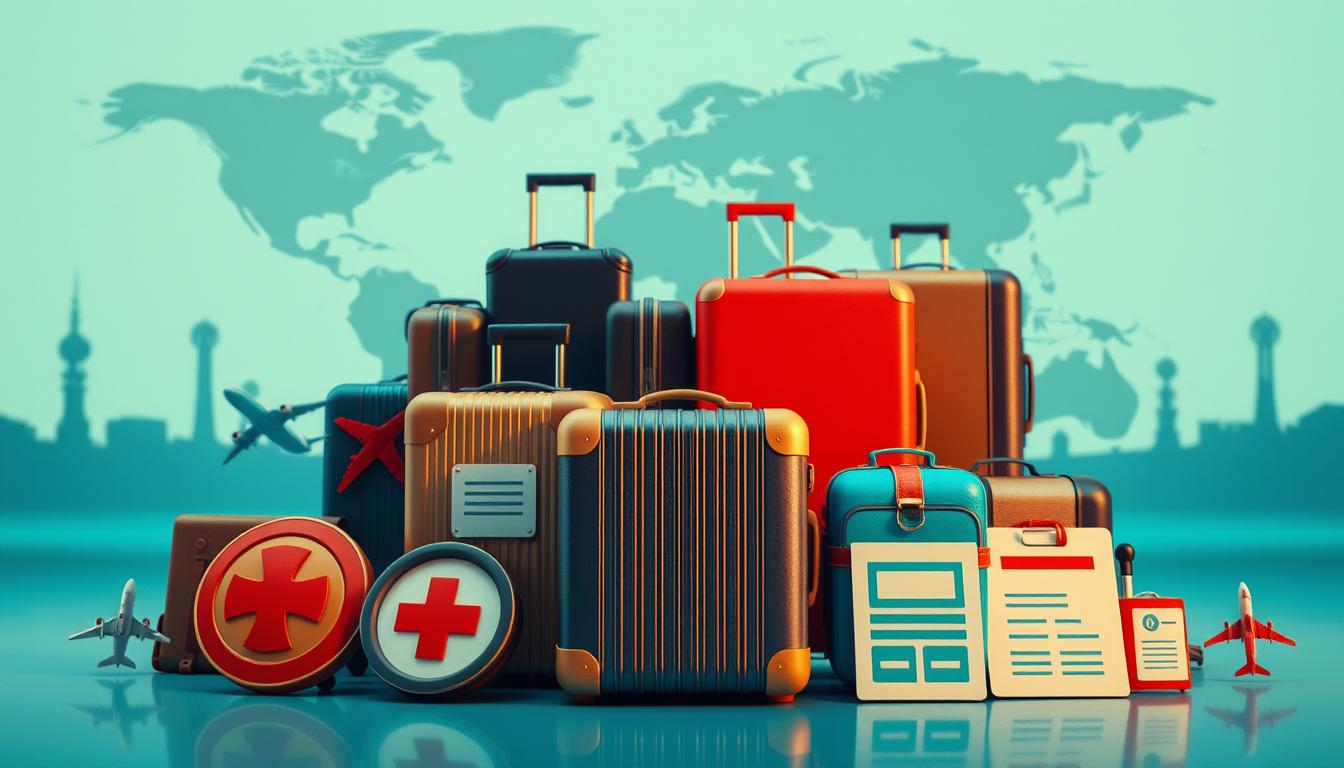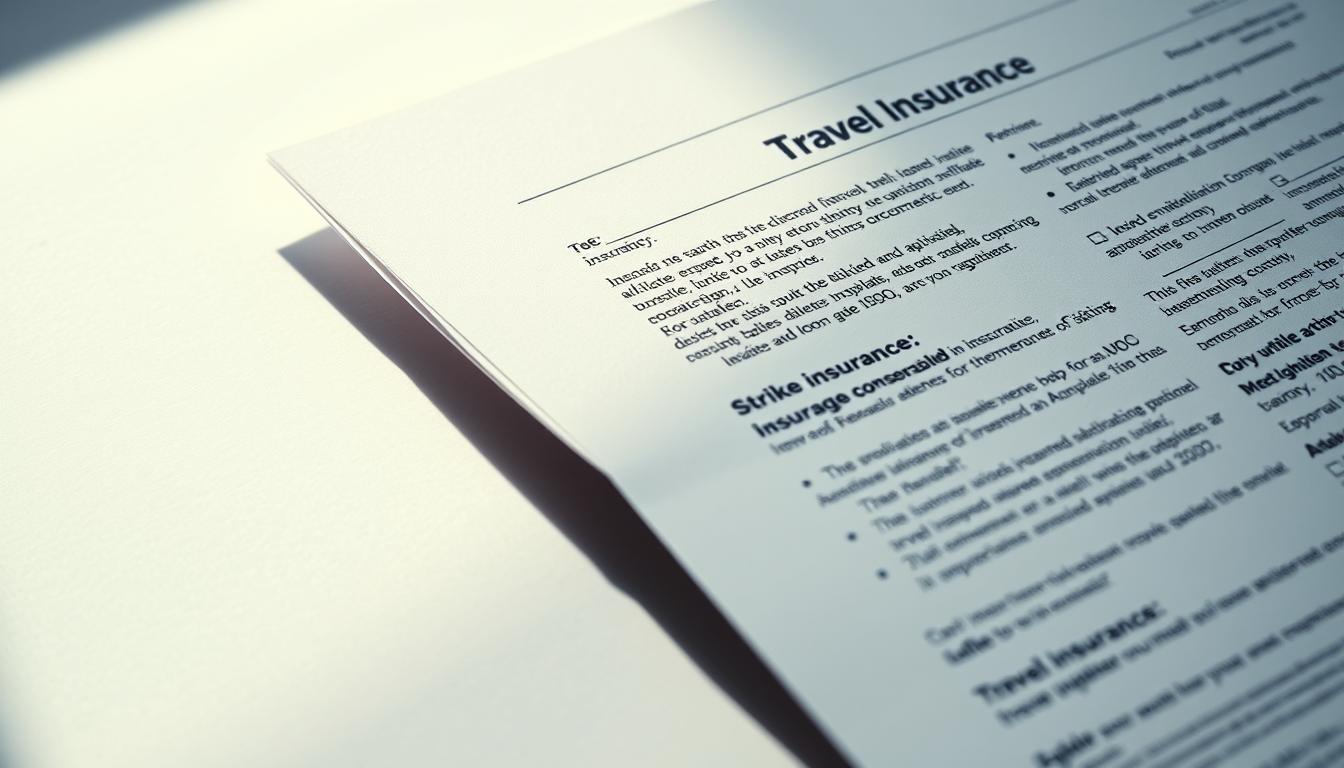Can a sudden labor action ruin your trip—and who pays when planes stop?
You’ve seen headlines: airline staff across Europe and the U.S. walking off over pay and staffing. Flights cancel, lines grow, and loyalty flyers get first rebooks.
We’ll help you cut through policy language. Here you’ll learn when a policy may reimburse nonrefundable fares, pay delay expenses like meals or a hotel, or fund alternate transport to catch a cruise or tour.
Timing matters. If a labor action was announced before you bought a plan, most insurers deny claims as foreseeable. But if a strike starts after purchase, Trip Delay and Trip Cancellation benefits can step in.
Read on to see clear examples, simple next steps for the moment a disruption hits, and which benefits give the most protection—so you can travel with more confidence.
Why airline strikes matter now: rising disruptions and what travelers should expect
A single week in 2024 made clear how quickly plans can unravel at airports.
More than 1,500 flights were canceled across Europe in a single week as air traffic controllers, cabin crews, and baggage handlers walked out. In 2023, transport-related labor actions rose 28%, and the trend continued into 2024 due to wage disputes and inflation.
Countries like France, Germany, and the U.K. felt big impacts. Carriers such as Ryanair, Lufthansa, and Air France reported major disruption. Not every flight stops—many strikes are single-day or rolling—yet the ripple effect can last.
- Expect slower check-in, long security lines, and harder-to-find rebookings.
- Reduced baggage handling and stressed service teams raise mishandling risk.
- Frequent flyers may get earlier rebooking; others wait in long queues.
| What surged | Where | Common impact |
|---|---|---|
| Transport labor actions | Europe (2023–24) | Cancellations, delays, rebooking bottlenecks |
| Cancelled flights (peak week) | Multiple countries | 1,500+ flights affected |
| Key affected roles | Air traffic, cabin, ground staff | Slower operations, baggage issues |
Does travel insurance cover strikes? The short answer and what “coverage” really means
When a labor walkout interrupts plans, the answer depends on timing and wording. The short answer: many plans will reimburse unexpected strike losses if you bought the plan before the action was public.
What insurers call a covered reason
Insurers often list “strike,” “labor dispute,” or “industrial action” as a qualifying reason for Trip Cancellation, Trip Delay, or Trip Interruption. A common trigger is a prevented arrival for at least 24 hours or missing half of your scheduled trip.
When the airline must help versus when the insurer pays
- Airlines handle immediate rebooking and refunds for canceled services.
- Insurance steps in for nonrefundable prepaid costs and eligible extra expenses.
- Timing is key: if a strike was known before you bought the policy, losses are usually excluded.
Real-world scenarios
| Scenario | Typical outcome | Benefit used |
|---|---|---|
| Canceled flight pushes arrival to next day | Claim nonrefundable trip costs | Trip Cancellation |
| Rolling strike delays departure | Meals, hotel reimbursed after hours | Trip Delay |
| Missed cruise embarkation | Alternate routing or unused value paid | Trip Interruption |
Read policy definitions closely. Clear terms and timely purchase give you the best chance of a successful claim when a strike disrupts your plans.
Key benefits that can help during strikes: what typical travel insurance plans may cover
When an airline disruption derails your schedule, a few common benefits can reduce cost and stress. Read the triggers and limits so you know what to expect and what to document.
Trip Cancellation
If a labor action prevents your carrier from arriving for at least 24 consecutive hours, Trip Cancellation often lets you cancel and claim prepaid, nonrefundable trip costs. Keep booking receipts and the airline notice.
Trip Delay
Most plans require a minimum delay—commonly 3–12 hours—before Trip Delay pays. Eligible expenses usually include meals, a hotel night, and local transportation. Save itemized receipts.
Trip Interruption
If you miss half of your itinerary or can’t reach the destination for 24 hours, Trip Interruption can reimburse unused trip value and reasonable transport to rejoin or return home.
Missed Connection & alternate transportation
- Missed Connection: Lodging and rerouting to catch a cruise or tour may qualify.
- Alternate transportation: Some plans reimburse a new ticket, net of any refunds, to get you to your destination.
- Benefit caps, daily limits, and triggers vary—confirm them on your policy and call 24/7 assistance for help sourcing options.
What’s not covered: known events, exclusions, and timing pitfalls
Not every labor disruption triggers a payout — many events are excluded before your coverage starts. If a strike announced or strongly signaled before you buy a plan, losses are often treated as foreseeable and denied.

Read policy wording closely. Some policies exclude actions when the striking employees work for the carrier or an affiliate that sold your ticket. Civil disorder and unrest are also common exclusions.
Documentation and proof
Claims usually need proof that delay thresholds were met—often 3–12 hours. Keep airline notices, boarding passes, rebooking records, and timestamped messages.
- Timing is critical: if a public warning existed before purchase, the claim may fail.
- If your carrier refunds your ticket, insurers may deny duplicate costs.
- Save itemized receipts for meals, lodging, and transport tied to the eligible delay period.
| Issue | What insurers look for | Action you should take |
|---|---|---|
| Foreseeable event | Strike announced before policy effective date | Do not expect coverage; cancel or reschedule directly with provider |
| Carrier employee action | Striking employees employed by your carrier | Check exclusions; contact 24/7 assistance |
| Delay threshold | Minimum hours required (commonly 3–12) | Collect official delay notices and receipts |
| Refunds | Airline refunds reduce insurer liability | Claim only unreimbursed, eligible costs |
When in doubt, call your insurer’s 24/7 assistance right away to confirm what your specific policy will and will not pay during an evolving labor action.
How rules differ by region: United States refunds vs. European compensation
Rules change a lot by jurisdiction, so knowing local rights helps you act fast. In some places, the law forces an airline to refund you. In others, regulators may pay cash when the carrier is at fault.
United States: refunds for cancellations and significant changes
In the U.S., if your carrier cancels or makes a major change and you reject the alternative, you can get a refund of fares and ticket fees. That refund right is mandatory.
However, airlines are not required to pay for hotels, meals, or other incidentals. Some carriers may offer vouchers or goodwill help, but that is discretionary under each airline’s customer policy.
European Union and U.K.: EU261/UK261 and “extraordinary circumstances”
Under EU261/UK261, passengers may get compensation up to €600 or £520 for long delays or cancellation when the airline is responsible—such as staff pay disputes.
But if the cause is an external air control action or another “extraordinary circumstance,” the airline can deny that payout. Still, airlines should rebook you or refund your ticket when a flight is canceled.
- Combine routes: You can seek airline refunds or regional compensation and also claim under a policy for eligible, unreimbursed losses.
- Document everything: Save delay lengths, official notices, and rebooking details to support claims on both fronts.
- Decide fast: Knowing the regional framework helps you choose whether to wait, request a refund, or reroute to reach your destination.
| Region | Typical remedy | Limits |
|---|---|---|
| United States | Mandatory refund for canceled or significantly changed flight | No mandated hotel/meal payments; airline discretion |
| EU / U.K. | Possible cash compensation plus rebooking or refund | No payout for extraordinary circumstances like third‑party air control actions |
| Both | Airline must rebook or refund | Keep receipts and carrier notices for claims |
Choosing the right policy for strike risks: what to check before you buy
Pick a plan that matches how much disruption you can tolerate—some limits kick in fast, others only after a long delay.
Start by checking delay thresholds. Many policies require a minimum delay—commonly between 3 and 12 hours—before benefits apply. Shorter triggers (3–6 hours) help during rolling labor events; longer ones may leave you paying out of pocket.
Read policy language for explicit terms like “strike,” “labor dispute,” or “industrial action.” If those words are missing, your claim could be denied when staff action interrupts your trip.
Consider a CFAR upgrade. Cancel For Any Reason typically reimburses 50–75% of insured trip costs but must be bought soon after your first trip payment and before any known labor news.
- Compare delay thresholds: shorter triggers unlock benefits sooner.
- Scan wording: confirm “strike” or similar terms are listed.
- CFAR rules: buy early and expect partial reimbursement.
- Purchase timing: once a strike is public, new plans usually exclude it.
- Check caps: per-person and per-day limits, and alternate transport rules.
| Factor | What to look for | Why it matters |
|---|---|---|
| Delay threshold | 3–6 hours vs. 12+ hours | Determines when delay benefits begin |
| Policy wording | Includes “strike” / “labor dispute” | Specifies eligible events for claims |
| CFAR upgrade | Purchase window and reimbursement % | Gives flexible cancellation if unrest grows |
| Purchase timing | Buy before public notice | Known events are typically excluded |
What to do when a strike hits: step-by-step actions to protect your trip and wallet
When staff walk off and gates go quiet, acting fast can save your trip and wallet. Start at the carrier desk or app and ask for rebooking on partner airlines. Request written confirmation that lists the cause and delay length.
Work with your carrier first: rebooking and partner airlines
Airlines typically rebook affected passengers, and loyalty members often get priority. If timing is tight, accept the first reasonable option but keep notes of alternatives offered.
Track and save everything: receipts, delay notices, and communications
Save every receipt—meals, hotel, rides—and keep boarding passes and timestamped delay notices. Claims hinge on documentation; photograph screens and keep emails.
Use 24/7 assistance: finding alternate routes and catching up to your itinerary
Call your insurer’s 24/7 assistance to map the best way to reach your destination. They can check alternate transportation and advise which extra expenses become eligible once you pass the policy time threshold.
- Note: If you accept a refund, document the airline’s offer and your choice.
- Avoid costly upgrades; stick to reasonable costs to ease claims.
- Be polite to staff—calm teamwork often finds faster solutions during strikes.
| Action | Why it helps | What to keep |
|---|---|---|
| Ask for partner rebooking | Gets you on the next flight | Written confirmation |
| Call 24/7 assistance | Finds routes and confirms benefits | Call reference number |
| Save receipts | Support claim for expenses | Itemized bills and tickets |
Conclusion
A clear plan and quick action protect both your budget and your trip. If an unexpected labor action affects a flight, start with the airline and gather written proof. Save receipts for hotel nights, meals, and transport.
Buy protection early and scan policy wording for “strike” and similar terms. Good benefits — like Trip Cancellation, Trip Delay, and Trip Interruption — help limit out‑of‑pocket expenses when a problem hits.
Know regional rules: U.S. law favors refunds for cancelled flights; EU261/UK261 can add compensation when the airline is responsible. Keep calm, document everything, and call 24/7 assistance for help getting back on track.
With the right plan and quick steps, you can reduce costs and keep exploring with confidence.


